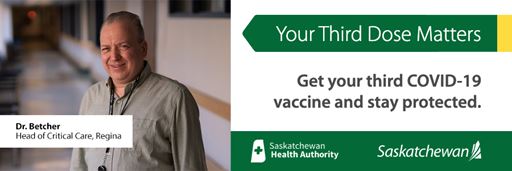Released on March 31, 2022
Third Dose Key to Protection from Omicron
The Government of Saskatchewan has launched the 'It Matters' campaign to remind all residents age 12 and older that if it's been five months or more since your second COVID-19 vaccination shot, it's time to get that third dose.
The third dose matters.
Vaccination is a necessary part of Living with COVID. Omicron transmission continues in all regions of the province and immunity from the vaccine decreases over time. The third dose provides optimal protection from the current COVID-19 variant. Even if you have had COVID-19, you should get your third dose as the immunity we get from vaccination is better than that which develops from having COVID-19.
The four week campaign includes digital, print, and radio as well as posters and billboards. While it is primarily targeting those fifty and older who have been at elevated risk for severe outcomes, transmission is occurring in all age groups.

All residents 12 years and older can help protect themselves by receiving both COVID-19 vaccinations and the third dose as soon as they are eligible. Vaccination appointments are available now through Saskatchewan Health Authority clinics and pharmacies throughout the province.
At this time, designated at-risk populations are eligible to receive a fourth dose.
Weekly COVID-19 Epi Report
Issued Thursdays, the Ministry of Health's COVID-19 integrated epidemiology (epi) report utilizes multiple data sources and includes laboratory-confirmed cases, deaths, tests, vaccination information provincially and by zones, as well as hospital and ICU census trends and distribution of rapid antigen tests. The epi report this week looks at data from Sunday, March 20 to Saturday, March 26, 2022. The hospitalization data is a comparison from March 23 to March 30, 2022.
The integrated epi report can be found online at saskatchewan.ca/COVID-19-cases.
Summary for the week of March 20-26, 2022
- 7,449 laboratory tests were performed in Saskatchewan reflecting 6.2 tests performed per 1,000 population.
- The number of tests was similar to the number of tests in the previous week (7,488).
- Almost one in eight laboratory tests were positive (weekly test positivity of 12.3 per cent), slightly higher than the previous week.
- 1,196 new cases were confirmed reflecting about 1.0 laboratory-confirmed cases per 1,000 population.
- The number of new laboratory-confirmed cases was about 34 per cent higher than the number of new cases in the previous week (894).
- There were 400 new lineage results reported this week. Of the 400 variants of concern identified by whole genome sequencing, all were Omicron.
- The Omicron BA.2 sublineage accounted for 15.5 per cent of the variants of concern reported this week, a decrease from 25.9 per cent the previous week.
- There were 20 newly-reported COVID-19 deaths, about 39 per cent lower than in the previous week (33).
- There were 25.7 COVID-like illness patients per 1,000 emergency department visits which is lower than the average weekly rate in the previous six weeks (35.2 per week/1,000 visits).
- Ten (10) confirmed COVID-19 outbreaks in long-term care and care home settings were reported this week.
- As of March 26, of the population five years and older, 85.7 per cent received at least one dose of a two-dose COVID-19 vaccine and 80.6 per cent completed a series.
- Among the population 18 years and older, 51.3 per cent had received at least one booster vaccination.
- As of the week of March 28, there have been 113 Paxlovid prescriptions provided and 286 monoclonal antibody infusion treatments administered.
- More than 19.3 million rapid antigen test kits have been distributed in the province. They are easily accessible at 630 locations.
-30-
For more information, contact:
Health
Regina
Phone: 306-787-4083
Email: media@health.gov.sk.ca
